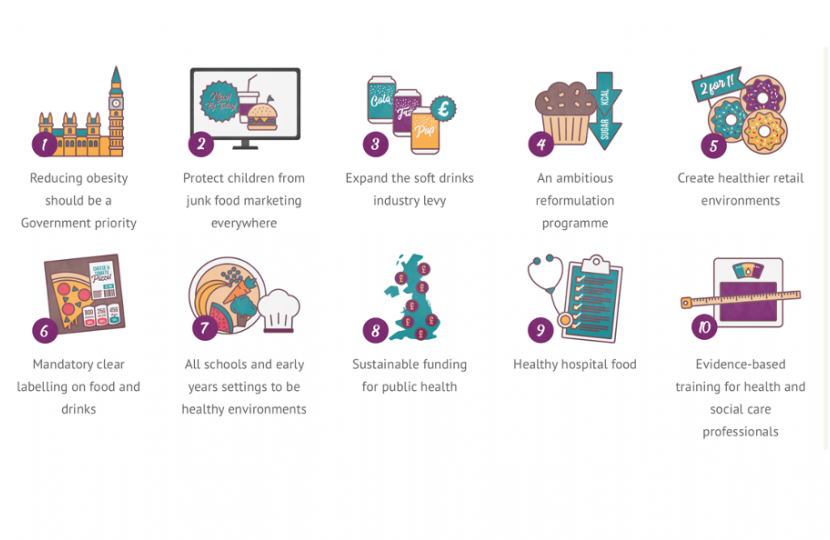
Sir David Amess put in to speak in the General Debate on Implementing the 2020 Obesity Strategy on 27 May, but was not put on the call list. Here is the speech that Sir David was going to give:
As so often is the case in this place, no words have been uttered that I haven’t heard before and that certainly is the case with obesity. When I was a member of the Health Select Committee under the excellent chairmanship of David Hinchliffe, the former Labour Member of Parliament for Wakefield, I suggested we had an enquiry into obesity. The report that we produced, if it had been acted on, would have saved us from implementing yet another strategy.
Yes of course if you eat too much, particularly in regards to salt, sugar and fat, you put on weight. Likewise, if you don’t take any exercise you put on weight. NHS 2020 statistics show that 67% of men and 60% of women were classed as overweight or obese. Obesity does not just affect adults though; there are 1 in 3 children leaving primary school who are already overweight or living with obesity.
As the chairman of the All-Party Parliamentary Group for Food and Health I am in regular contact with experts across the health industry and I was pleased that the Gracious Speech mentioned the Government’s commitment to supporting the health and wellbeing of the nation, with specific reference to obesity.
In order to efficiently implement the Government’s obesity strategy, the root causes of obesity must be examined. That is why it is extremely important for there to be collaboration between manufacturers, the educational sector, the Government, health professionals and the food and drink industry. With specific targets and policies aimed at promoting physical exercise and helping people lose weight, people can enjoy longer, healthier lives.
I am pleased that the Government has introduced a childhood obesity plan which commits to the ambitious target of halving childhood obesity by 2030. However, obesity prevalence is highest amongst the most deprived groups in society. This is sowing the seeds of adult diseases and health inequalities in early childhood which should be addressed in the Government’s strategy.
It is welcoming to see the Government act on its promises to push for healthy eating and a balanced diet, but I’ve heard it all before. Television programmes have been made about it and nothing changes. Why is it going to be different this time I ask the Minister?
I have submitted many written questions recently urging the Government to promote healthy eating and manage portion sizes. The calorie labelling on menus will help people make healthier choices and hopefully reduce the health impacts of obesity and the financial costs that come with it. It is estimated that overweight and obesity related conditions across the United Kingdom cost the NHS £6.1 billion each year. There have been concerns for those with eating disorders, but there is a provision in the regulations which permits businesses to provide a menu without calorie information at the request of the customer.
Similarly, the Government will legislate through a Health and Care Bill to ban junk food adverts online and on television before the 9pm watershed. It has also confirmed that it will restrict promotions on high fat, salt and sugar food and drinks in retailers from April 2022 and fulfil its commitment to a wide-ranging review into food labelling. This is very welcoming considering there are over 10,000 adults with diabetes in the Southend Clinical Commissioning Group area, and obese people are up to 80 times more likely to develop type 2 diabetes.
It is estimated that total costs associated with diabetes in the United Kingdom are over £23 billion – and this is predicted to rise to over £39 billion by 2035. I ask the Government to urgently implement its commitments in the Tackling Obesity: Government Strategy paper and to make legislative changes to solve this damaging and costly health issue.

